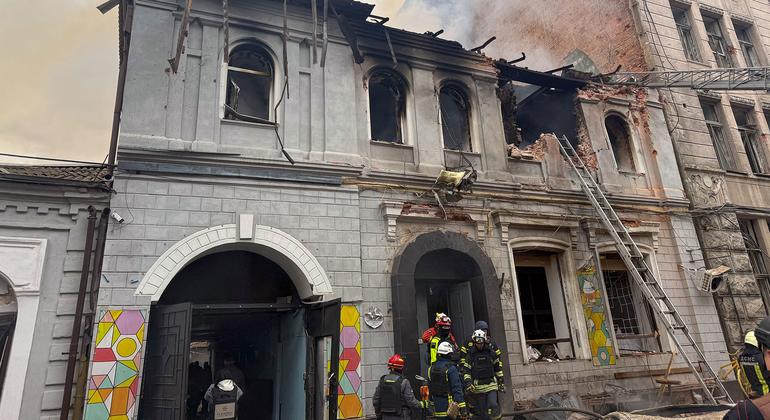The heavy humanitarian and psychological toll of these strikes is compounded by the fact that this year’s winter is expected to be much colder than last year’s – with the level of destruction of electrical installations exceeding the capacity for reconstruction.
“We are very worried about the fate of people living in high-rise buildings in cities close to the front line – this could turn into a major crisis.“, Matthias Schmale, United Nations resident and humanitarian coordinator in Ukraine, told reporters in Geneva.
Mr Schmale’s comments come a day after a massive Russian attack across Ukraine reportedly targeted critical energy infrastructure in civilian areas.
High-rise target
With 705 munitions reportedly deployed, the barrage was among the largest since the start of Russia’s full-scale invasion in 2022.
If residents of front-line cities like Zaporizhzhia, Kharkiv or Dnipro, living in high-rise buildings, are “stranded without electricity or drinking water for days on end” during a harsh winter, Schmale explained, then “there is no way that with the available resources we will be able to respond to a major crisis within a crisis.”
“The destruction of energy production and distribution capacities at the start of winter has an obvious impact on the civilian population and constitutes a form of terror,” insisted Mr. Schmale. “Continuing strikes across the country also make it feel like nowhere is safe…for almost a year and a half there, [I] we feel and feel that the impact of this war on mental health is increasing,” he added.
Drone Wars
“It’s increasingly a technological war, a war of drones“, said the UN official, emphasizing that drones were responsible for a third of all civilian casualties recorded in 2025.
This year, the number of civilian deaths increased by 30% compared to 2024.
Civilian victims of Thursday’s attack included a seven-year-old girl who died in hospital following a strike in the central Vinnytsia region.
Earlier this week, an attack severely damaged a children’s hospital in the city of Kherson, injuring a child and health workers.
The World Health Organization (WHO) recorded 364 attacks affecting health establishments in Ukraine between January and October 2025.
School horror
Mr Schmale recounted his own recent experience, which he called a “poignant moment”, visiting a kindergarten in Kharkiv just after it was hit by three missiles.
“I imagined that as a parent, you drop your kids off in the morning at a kindergarten and then get called back two and a half hours later … to pick up your traumatized children who have just had three missiles hit their kindergarten,” he said.
“This notion of safety for vulnerable people and children is in reality constantly violated. »
Regarding the situation in the Ukrainian territories occupied by the Russian Federation, the UN humanitarian coordinator said that the longer the war continues, “the more we risk forgetting the vulnerable people” in these areas.
According to estimates, “around a million people are vulnerable in the so-called temporarily occupied territories,” he said.
Attack on citizenship
Mr. Schmale also warned of the “attacks on fundamental rights” that are underway there, “including against citizenship”.
“From what I understand, the occupying forces insist that Ukrainians now register for Russian documents in the occupied territories, and if they do not do so, they will be considered illegal and may be deported or arrested,” he said.
The UN official further expressed concern over dwindling funds for Ukraine’s humanitarian response, describing a “downward trend.”
“In 2022, we had more than $4 billion available for humanitarian work in Ukraine. [In] In 2023, it was still $2.6 [billion]. Last year, remarkably, 2024, with everything going on in the world, there was still $2.2 left [billion]“, he said.
“This year we are at $1.1 [billion]”, so far, half of what we got last year and two months to go” until the end of 2025, he added.
Originally published at Almouwatin.com







